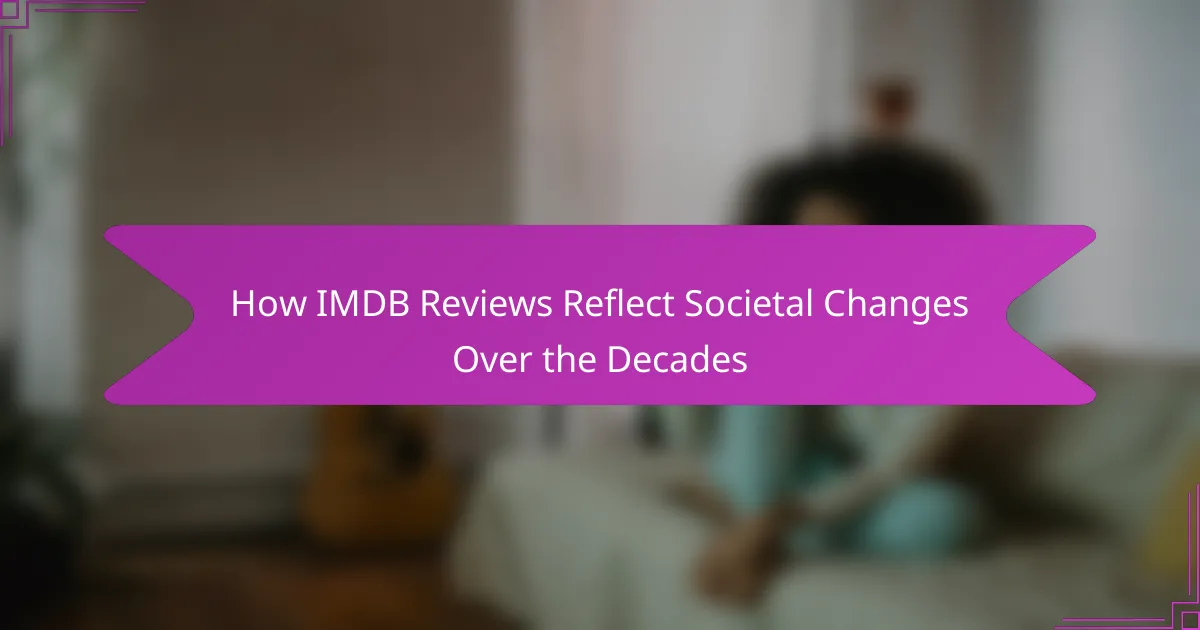IMDB reviews have evolved over the decades, mirroring significant societal changes and shifts in cultural values. From the rise of user-generated content in the 2000s to the increasing emphasis on diversity and representation in the 2020s, these reviews provide insight into how audience expectations and engagement with film have transformed in an interconnected digital landscape.
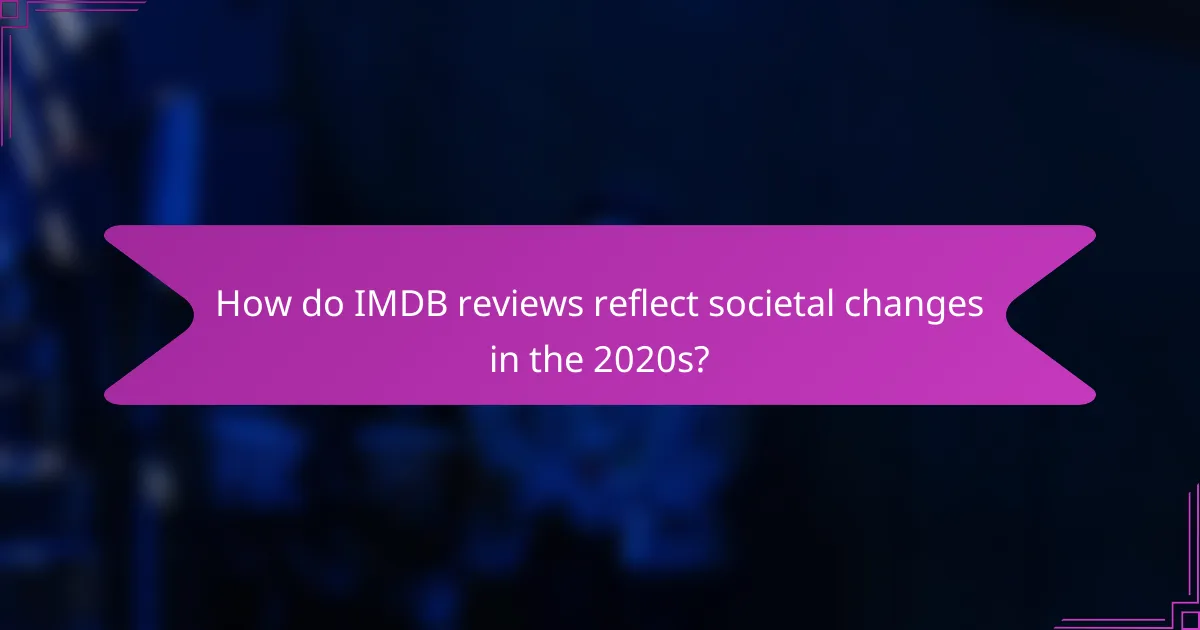
How do IMDB reviews reflect societal changes in the 2020s?
IMDB reviews in the 2020s illustrate significant shifts in societal values, particularly regarding diversity, representation, and the influence of social media. As audiences become more vocal about their expectations, these reviews serve as a barometer for changing cultural norms and priorities in the film industry.
Increased focus on diversity and representation
The 2020s have seen a heightened emphasis on diversity and representation in film, reflected in IMDB reviews. Viewers increasingly critique films based on how well they portray various cultures, genders, and identities, often calling out productions that lack inclusivity.
This shift encourages filmmakers to prioritize diverse storytelling, leading to a broader range of narratives. For instance, films featuring strong female leads or stories centered around underrepresented communities tend to receive more favorable reviews, as audiences appreciate authentic representation.
Impact of social media on film perception
Social media has transformed how films are perceived and discussed, significantly influencing IMDB reviews. Platforms like Twitter and Instagram allow audiences to share their opinions instantly, creating a ripple effect that can elevate or diminish a film’s reputation quickly.
For example, a film that sparks controversy or conversation online may see a surge in reviews, both positive and negative, as viewers engage with the discourse. This dynamic can lead to polarized opinions, where a film’s rating might fluctuate based on trending topics or viral moments related to its content.
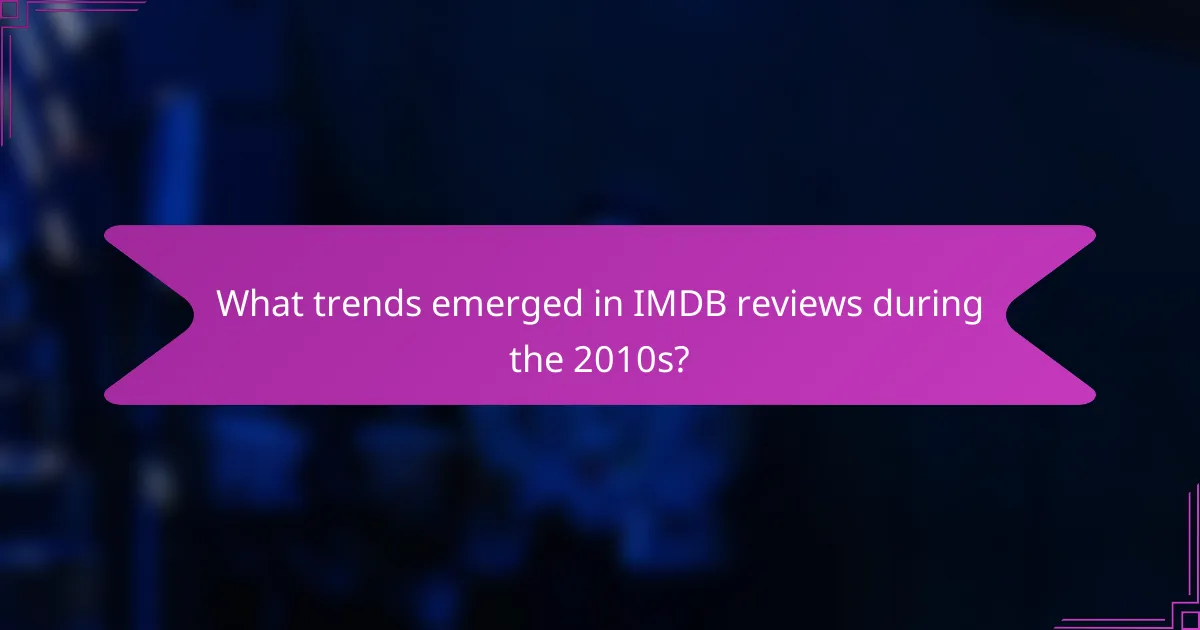
What trends emerged in IMDB reviews during the 2010s?
During the 2010s, IMDB reviews reflected significant shifts in viewer preferences and societal attitudes, particularly influenced by the rise of digital streaming and changing critical standards. These trends highlight how audiences engage with content and express their opinions in an increasingly interconnected world.
Rise of streaming platforms like Netflix
The emergence of streaming platforms, especially Netflix, transformed how audiences consume films and television shows, leading to a surge in IMDB reviews. With easy access to a vast library of content, viewers began sharing their opinions more frequently, resulting in a broader range of reviews across genres.
This shift allowed for niche content to gain visibility, as users were more inclined to review lesser-known titles alongside mainstream hits. Consequently, IMDB became a platform where diverse voices could be heard, reflecting a more inclusive view of entertainment preferences.
Shift towards more critical reviews
In the 2010s, IMDB reviews became increasingly critical, with users adopting a more analytical approach to their feedback. Reviewers began to emphasize storytelling, character development, and production quality, moving beyond simple ratings to detailed critiques.
This trend indicates a growing sophistication among viewers, who now expect more from their entertainment. As a result, filmmakers and studios are more aware of audience expectations, leading to a potential improvement in the quality of content produced.
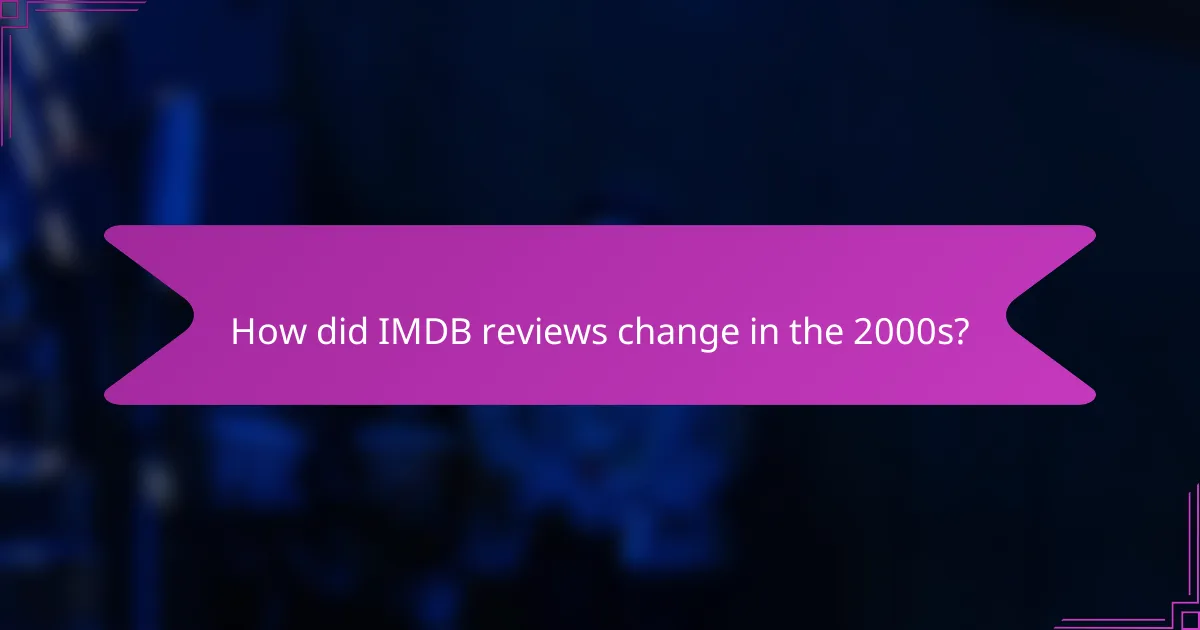
How did IMDB reviews change in the 2000s?
IMDB reviews in the 2000s saw a significant transformation as user-generated content became more prevalent, reflecting broader societal changes in media consumption and engagement. This era marked the rise of online platforms where audiences could share their opinions, leading to a more democratized approach to film criticism.
Growth of user-generated content
The 2000s experienced a surge in user-generated content, with IMDB becoming a primary platform for movie enthusiasts to express their views. This shift allowed everyday viewers to contribute reviews, democratizing film criticism and providing diverse perspectives that were previously absent from traditional media.
As more users participated, the volume of reviews increased dramatically, leading to a richer tapestry of opinions. This growth fostered a sense of community among film fans, encouraging discussions and debates that influenced viewing trends and preferences.
Influence of blockbuster franchises
Blockbuster franchises began to dominate the film landscape in the 2000s, significantly impacting IMDB reviews. Major series like “Harry Potter,” “The Lord of the Rings,” and “Star Wars” not only attracted large audiences but also generated extensive discussions among fans, reflected in their reviews.
The presence of these franchises often led to polarized opinions, with passionate fans either praising or criticizing the films. This dynamic created a unique environment on IMDB, where reviews could serve as battlegrounds for differing viewpoints, illustrating the cultural significance of these cinematic universes in shaping societal trends and expectations.
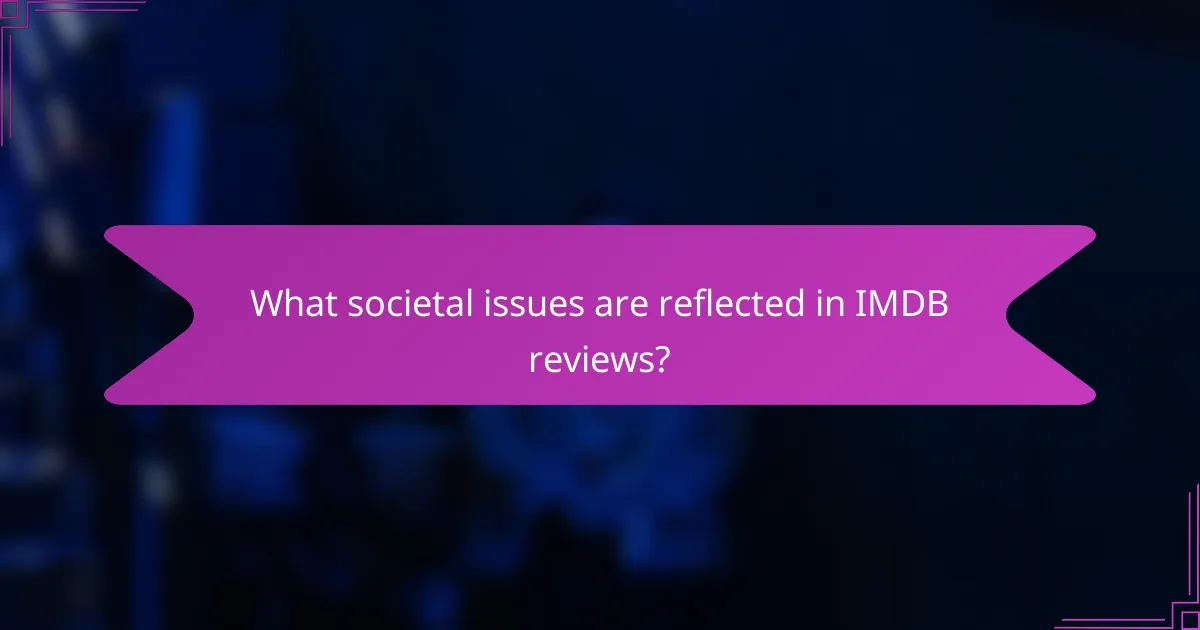
What societal issues are reflected in IMDB reviews?
IMDB reviews often mirror societal issues by capturing audience sentiments and reactions to cultural shifts over time. These reviews provide insights into how viewers perceive political events, representation of marginalized groups, and evolving social norms.
Responses to political events
IMDB reviews frequently reflect the public’s response to significant political events, showcasing how films resonate with contemporary issues. For instance, during times of political unrest, reviews may highlight themes of resistance or critique governmental actions depicted in films.
Films released during election years or in the wake of major policy changes often receive polarized reviews, with audiences expressing their approval or discontent based on their political affiliations. This trend illustrates how cinema serves as a lens through which societal tensions are explored and debated.
Representation of gender and race
The representation of gender and race in films is a prominent theme in IMDB reviews, revealing shifts in societal attitudes towards diversity and inclusion. Over the decades, as discussions around equality have gained traction, reviews increasingly critique or praise films based on their portrayal of women and people of color.
For example, films that feature strong female leads or diverse casts often receive positive feedback, while those lacking representation may face backlash. This evolution in viewer expectations highlights a growing demand for authentic storytelling that reflects the complexities of modern society.
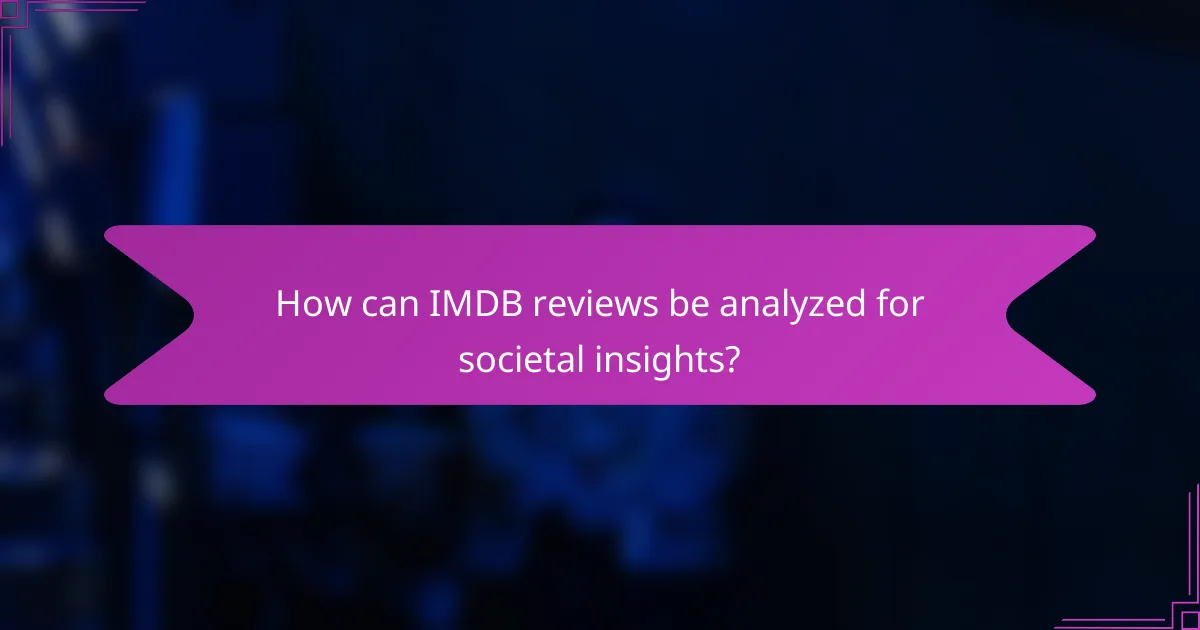
How can IMDB reviews be analyzed for societal insights?
IMDB reviews can be analyzed to reveal societal insights by examining the language, themes, and sentiments expressed over time. This analysis helps to identify shifts in cultural values, social issues, and audience expectations as reflected in film and television critiques.
Text analysis techniques
Text analysis techniques involve extracting meaningful patterns from IMDB reviews to understand societal trends. Common methods include keyword extraction, topic modeling, and frequency analysis, which highlight recurring themes and sentiments in viewer feedback. For example, a rise in reviews mentioning “diversity” or “representation” may indicate growing societal awareness of these issues.
When employing text analysis, consider the context of the reviews, such as the time period and genre of the films. This contextual understanding can enhance the interpretation of the data and provide deeper insights into changing societal norms.
Sentiment analysis tools
Sentiment analysis tools assess the emotional tone of IMDB reviews, categorizing them as positive, negative, or neutral. These tools use natural language processing algorithms to analyze the language used in reviews, providing a quantitative measure of audience sentiment over time. For instance, a significant increase in negative sentiments about a particular genre may reflect broader societal discontent.
When using sentiment analysis, it is crucial to choose tools that can handle nuances in language, such as sarcasm or cultural references. Combining sentiment analysis with text analysis can yield a more comprehensive view of how societal attitudes towards films evolve, allowing for a richer understanding of cultural shifts.

What role do IMDB reviews play in film marketing?
IMDB reviews significantly influence film marketing by shaping public perception and generating buzz around a movie. Positive reviews can enhance a film’s visibility and attract larger audiences, while negative feedback can deter potential viewers.
Influence on audience expectations
IMDB reviews help set audience expectations before they watch a film. High ratings and favorable comments can create anticipation, making viewers more likely to see the movie. Conversely, low ratings can lead to skepticism and reduced interest.
For instance, a film with an IMDB rating above 7 often garners more attention than one rated below 5. This rating system allows potential viewers to quickly gauge the film’s quality, impacting their decision-making process.
Impact on box office performance
The box office performance of films can be heavily influenced by IMDB reviews. Movies that receive strong ratings typically perform better financially, as positive word-of-mouth spreads through social media and online platforms.
For example, a film that opens with an IMDB rating of 8 or higher may see opening weekend revenues increase by tens of percent compared to those rated below 6. Filmmakers and marketers should monitor reviews closely and engage with audiences to enhance their film’s reception.
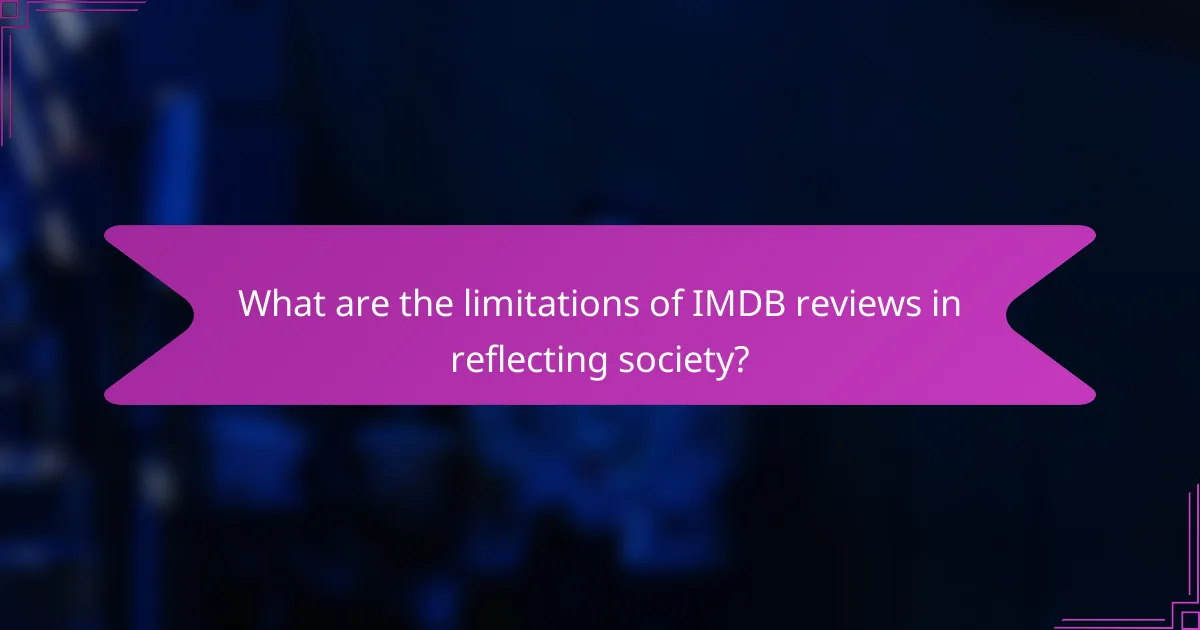
What are the limitations of IMDB reviews in reflecting society?
IMDB reviews have several limitations in accurately reflecting societal changes, primarily due to biases in user ratings and the demographic skew of reviewers. These factors can distort the representation of public opinion and cultural shifts over time.
Potential bias in user ratings
User ratings on IMDB can be influenced by personal preferences, cultural backgrounds, and even marketing strategies. For instance, films with large promotional budgets may receive inflated ratings, while independent films might be underrated due to lack of visibility. This bias can lead to a skewed perception of a film’s quality and its societal relevance.
Moreover, the tendency for users to rate films based on their emotional reactions rather than objective criteria can further complicate the reliability of these reviews. As a result, the ratings may not accurately reflect broader societal trends or shifts in cultural values.
Demographic skew of reviewers
The demographic composition of IMDB reviewers is often not representative of the general population. Typically, younger audiences, particularly males, are more active on the platform, which can lead to a narrow viewpoint on films. This skew can result in certain genres or themes being overrepresented or underrepresented in ratings.
For example, films that resonate more with older or diverse audiences might receive lower ratings simply because those demographics are less likely to participate in IMDB reviews. Understanding this demographic bias is crucial when analyzing how IMDB reviews reflect societal changes over the decades.
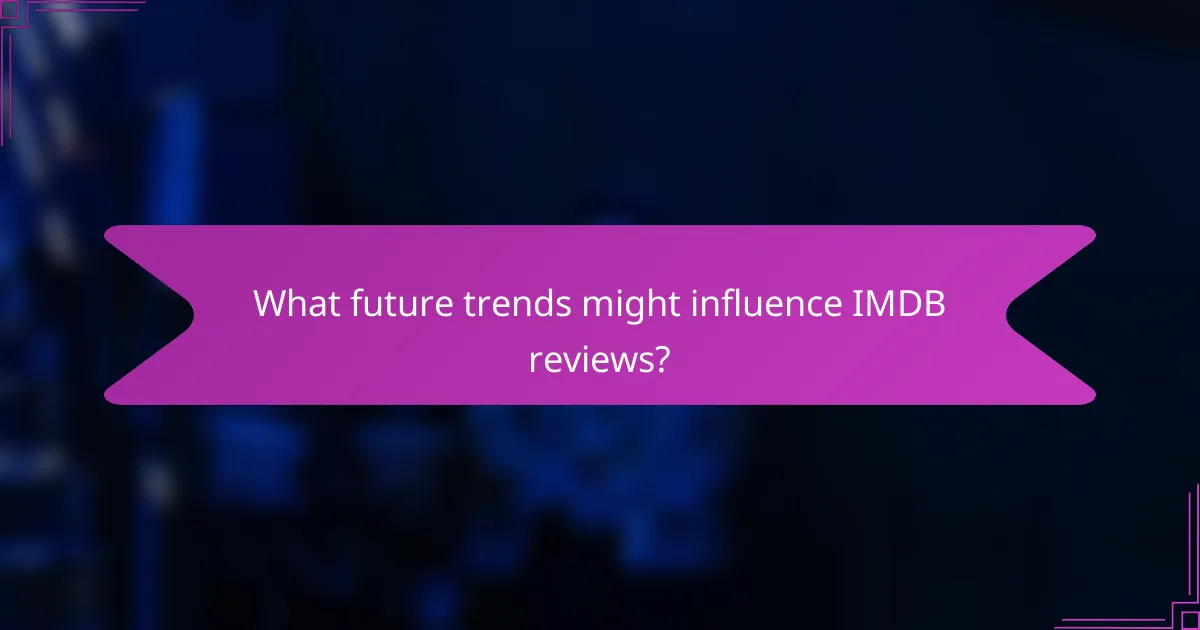
What future trends might influence IMDB reviews?
Future trends likely to influence IMDB reviews include the rise of AI-generated content and changing viewer demographics. As technology evolves, the way audiences engage with films and share their opinions may shift significantly.
Emergence of AI-generated reviews
AI-generated reviews are becoming increasingly common, leveraging algorithms to analyze viewer sentiments and generate content. These reviews can provide a quick overview of audience reactions, but they may lack the personal touch and nuanced perspectives of human reviewers.
As AI technology improves, the quality of these generated reviews may enhance, potentially influencing user perceptions and ratings on platforms like IMDB. However, viewers should remain cautious, as AI may not fully capture the emotional depth or cultural context of films.
To navigate this trend, users should look for indicators of authenticity in reviews, such as detailed critiques and personal experiences, rather than relying solely on AI-generated summaries. Engaging with a mix of human and AI perspectives can lead to a more rounded understanding of a film’s reception.
